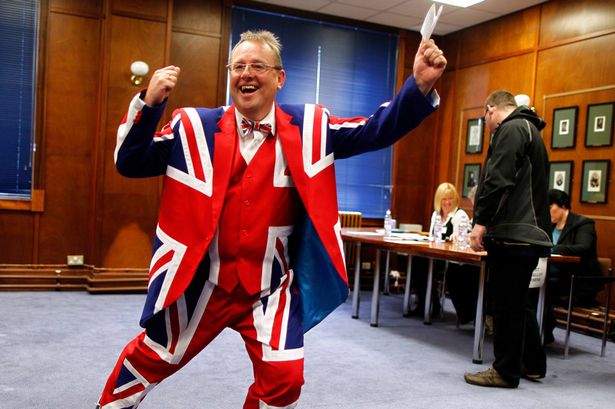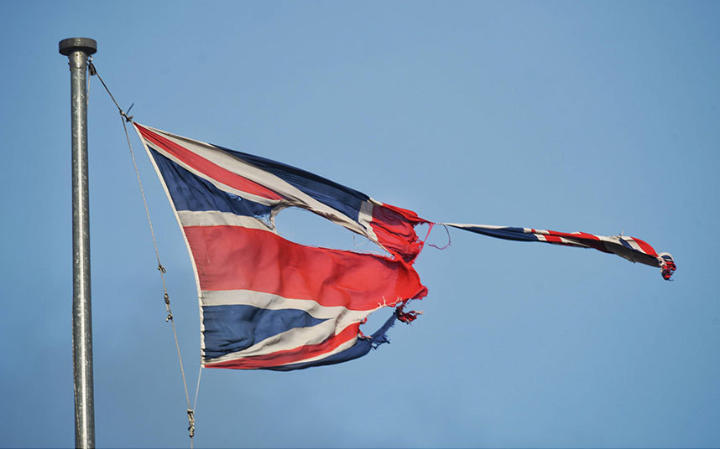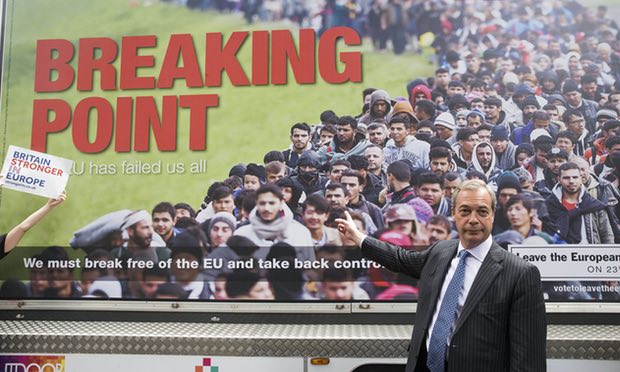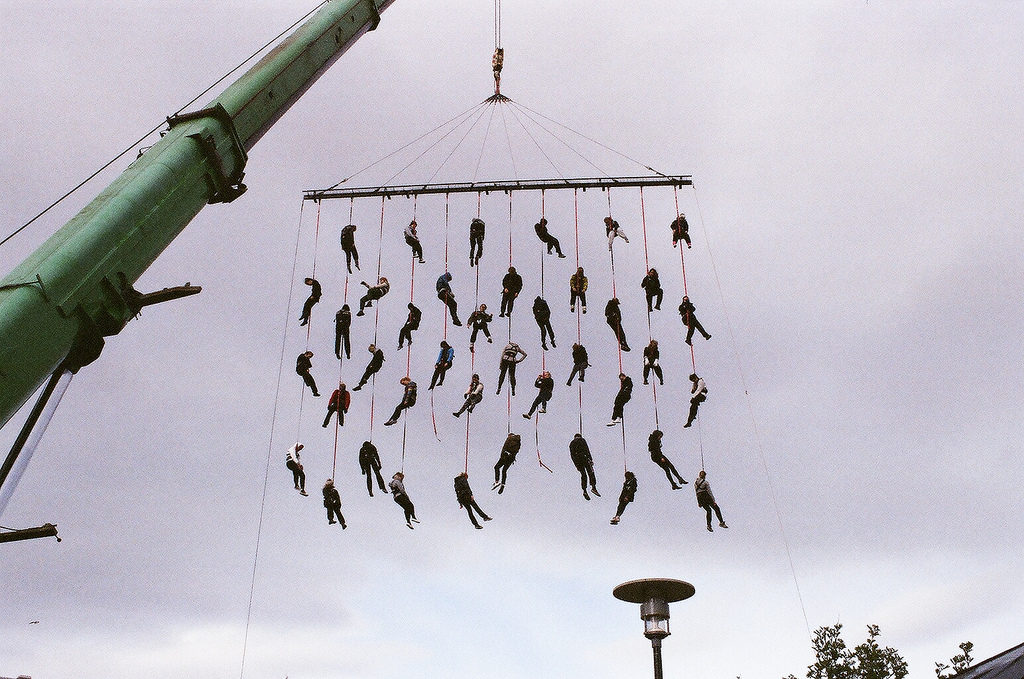 I’m getting a teensy bit ticked off with being told that I hate my country. “You think we can’t survive on our own,” Leave voters inform me whenever I dare to point out any potential pitfalls of the UK’s departure from the EU. “Stop talking the nation down, traitor!”
I’m getting a teensy bit ticked off with being told that I hate my country. “You think we can’t survive on our own,” Leave voters inform me whenever I dare to point out any potential pitfalls of the UK’s departure from the EU. “Stop talking the nation down, traitor!”
Because I don’t hate Britain in the slightest. I have lived and worked in the UK all my life and am proud of it all ends up. So to set the record straight, I’m going to roll out the union jack bunting and sing hallelujah for the nine industries in which my country leads the world.
Aerospace technology
The UK is the second biggest player in the world in aerospace engineering, excelling particularly in wing technology, one of the most specialised and lucrative areas. Last year, the UK aerospace sector grew by 6.5% to £31bn, 87% of which was exported. The industry employs 230,000 people in all, and unlike, say, banking, the whole country benefits, with large operations in Belfast, Broughton in Wales, Birmingham, Derby, and a huge cluster of activity in the south-west.
Financial services
Say what you like about bankers – I’ve had plenty to say about them in the past – but they do contribute a fair chunk to the economy. In 2016, financial and insurance services was worth £124.2bn in gross value added (GVA) to the UK, 7.2% of the total. The industry employs over a million people nationwide – 3.1% of all jobs in the UK – and the banking sector paid £24.4bn in tax to the exchequer in 2016. What’s more, the banking, insurance and pensions sectors are one of the few areas in which Britain is a huge net exporter. Exports of these services netted us over £60bn in 2016, vastly outweighing the £12bn imported.
Higher education
No fewer than 12 of the UK’s universities feature in the top 100 universities worldwide, from Oxford, widely admired for its excellence in the arts but also making huge strides in science, to Durham, with its world-renowned physics department and the pioneering Centre for the Advanced Study of the Arab World. There were 2.3 million students at the UK’s higher education institutions in 2015-16, providing 400,000 jobs and directly generating around £2bn for the economy each year – on top of the incalculable value of giving an outstanding education to a third of the populace.
Artificial intelligence
The UK owes its growing stature in AI largely to the existence of Google DeepMind, a company founded in London in 2010 and bought by Google in 2014. But a veritable explosion of innovative AI startups over the last few years, including language processing specialists VocalIQ, machine-learning keyboard SwiftKey, digital marketer Phrasee and neural network developers Magic Pony, has put the UK at the very vanguard of the field. Many recent developments – voice recognition software, predictive text and autonomous vehicles – have been driven by UK-based tech firms, leaving the UK uniquely poised to be a serious player in this young but booming sector. According to Accenture, artificial intelligence could add £654bn to the UK economy by 2035.
Electronics
Expertise at small-scale production and innovation are the two key drivers of the UK’s electronics success. While it can’t compete on an industrial scale with the likes of Japan and Korea, it can produce little marvels like the Raspberry Pi, which has now sold more than 12.5 million units. The UK electronics sector, the fifth largest in the world, has an annual turnover of £80bn a year and employs 800,000 people.
Life sciences
The life sciences – pharmaceuticals, biotech and medical research – are another area where the UK has taken giant strides in recent years, thanks again in large part to its thriving higher education system. We have a particular talent, it seems, for small molecules, therapeutic proteins and vaccines, and are among the chief voices on the Human Genome Project. By most metrics, the United States is the only country with a more cutting edge in matters medical; we’re ahead of the pack in neuroscience, parasitology and material science, and are the second most prolific producers of medical research papers – a jolly good show for the country with the 21st biggest population.
Life science projects in the UK contribute £56bn a year to the economy, support 482,000 jobs – which again are well distributed across the country – and attract more direct foreign investment than in any other European state.
Music
We may suck royally at Eurovision, but in the broader scheme of things, Britannia rules the airwaves. Domestic success often translates into success abroad, and we export £1.4bn worth of songs every year. Since the Beatles, we’ve seen acts from Pink Floyd to Adele, and Elton John to One Direction go global.
In 2015, British artists accounted for more than a quarter of all the albums purchased across Europe.
TV and film
Despite the best efforts of Channel 5 and the BBC’s comedy department, the UK still enjoys a reputation for top-notch television, and as a result, sales of UK-made programmes hit £1.3bn in 2015/16. TV, film, radio and photography (which the ONS unaccountably lumps together) provided 260,000 jobs in 2013 and produced a GVA of £10.8bn.
Sport
While UK Sport’s trophy cabinet may not exactly be heaving at the moment, for a nation of 64 million souls, we punch well above our weight. As well as the impressive medal hauls at the London 2012 and Rio 2016 Olympics, we’re always there or thereabouts in world tournaments of football, rugby and cricket, and are disproportionately represented in tennis, snooker, boxing, cycling, hockey, canoeing, rowing, fencing, darts, squash, polo, sailing and golf. Even in off years, sport generates around £20bn for the economy.
(Australia, for what it’s worth, aren’t even the reigning champions of Australian rules football. Papua New Guinea are.)

The future (aka, the punchline)
So there you have it! Britain really is great! We may no longer be a fearsome military power or an industrial powerhouse, but we’ve carved out a new niche for ourselves, at the heart of a global economy! So much for Talky McDownerson!
Hang on a sec. Who’s this? Oh, hi, TM. I see you’ve compiled a summary of reports from the respective fields on the predicted effects of a hard Brexit.
(These are not the opinions of cloistered academics, faceless journalists, or “out of touch” economists. These are detailed, fully researched assessments by people either within, or intimately involved with, the trades concerned. These people have no intrinsic bias towards Europe, only first-hand experience of how their businesses interact with the European Union and to what extent they depend on it.)
The list of worries expressed by leading figures in the aerospace industry is as long as the non-EU passports queue at Gatwick. Long border delays for parts in the event of departure from the customs union. Concerns about access to the best talent from the EU. Rising costs if the UK is forced out of the European Aviation Safety Agency.
Other EU countries – Germany and Spain in particular – are already vying for contracts after Brexit in the hope that trading conditions no longer favour the UK.
- “I’m scared witless” – Stephen Cheetham, chief executive, PK Engineering
- “We are very worried about the impact of Brexit on the whole Airbus discussion” – aerospace supplier interviewed in Financial Times
- “In terms of attractiveness … in terms of political stability, the UK goes down” – Andrew Mair, chief executive, Midlands Aerospace Alliance
I won’t spend too long on the impact of hard Brexit on financial services, as it’s one of the few areas the media have widely reported on. Suffice to say that the uncertainty caused by the vote alone has already wrought significant damage, with investments withheld and jobs and offices relocated to the mainland. The loss of passporting rights in the City of London is certain to prompt a mass exodus; rival financial centres from Dublin to Frankfurt to New York are salivating at the prospect of pillaging our capital of its coveted, lucrative institutions.
If David Davis walks away from the talks with the EU in September, as he seems intent on doing, he will be wiping out tens of thousands of jobs and setting a match to tens of billions in tax revenue.
In 2014-15, 20% of all students in UK higher education (437,000) were from abroad. While EU students are only liable for the same rates as UK citizens, those from outside the EU are charged more, so foreign students collectively pay £5bn a year in tuition fees –14% of universities’ total income. In addition, non-British students add around £26bn a year to the economy through their spending on and off campus, and indirectly support around 200,000 jobs.
But funnily enough, it seems not all foreigners are keen on being used as bargaining chips in negotiations or being attacked for speaking their own language in the street. Cambridge University has already seen a precipitous drop of 17% in applications from EU students, and Manchester University recently announced plans to axe 171 staff jobs, at least partly, according to the University and College Union, because of Brexit.
A falling pound, rising xenophobia, uncertainty over their futures and the faltering British economy are also driving away the best foreign tutors and lecturers.
The UK needs foreign nationals for its burgeoning AI industry more than most, suffering as it does from a critical shortage of digital skills. Far too few people are studying AI and other computer sciences to fill the positions locally, and almost 13 million British adults lack even the most basic IT skills. As a consequence, the IT sector recruits almost a third of its workers from elsewhere in the EU. For reasons discussed above, a hard Brexit is likely to drastically reduce the UK’s access to this talent pool. Reports of skills shortages are already emerging.
Since AI companies can set up almost anywhere, it’s primarily talent that attracts them, and if the UK loses its grip on the cream of Europe’s geeks, the business will go elsewhere.
As a footnote, a parliamentary report in October 2016 concluded that Brexit had thrown a crucial legal framework for AI and robotics, the General Data Protection Regulation, into doubt. It’s also jeopardised the free flow of data between the UK and the continent, crucial to the UK’s competitiveness.
Google DeepMind was founded by a British man born to Greek Cypriot and Singaporean parents, a Kiwi, and a Muslim Brit. Under the monocultural, send-’em-all-home regime proposed by nationalist Brexiters, it would never have seen the light of day.
A survey of the tech sector in early 2016 found that 84% felt it would be in the sector’s best interest if the UK stayed in the EU. Six per cent were undecided.
- “A lot of organisations are now looking elsewhere to base their Innovation Labs for artificial intelligence” – Chris Rosebert, head of data science & AI, Networkers technology recruitment
- “The funding that the research community has taken advantage of to hold its position internationally [in artificial intelligence and education research] has all come from the European Union” – Prof Rose Luckin, UCL Institute of Education
Insiders in the electronics industry have expressed fears about CE certification (European conformity). Tests to ensure that products meet agreed safety and quality standards are expensive, and if the UK adopts a different set of standards – in order, for example, to harmonise with America’s FCC – smaller British companies are unlikely to be able to afford to market their wares in Europe.
A more pressing problem is trade: if the UK crashes out of the EU without a deal, it will have to renegotiate free trade deals with other countries from scratch, a process that can take a decade or longer. In the interim, all British products would be subject to stiff tariffs (we’re not even guaranteed WTO status) and thus far more expensive than their competitors.
Fujitsu, Samsung and Hitachi (the second biggest private investor in the north-east after Nissan) are among the many electronics firms who have cautioned against a hard Brexit, warning that changes to the free movement of labour, customs operations and data passporting would mean job losses, a reduction in investment, and headquarters being relocated.
A report by thinktank Public Policy Projects, led by former health secretary Stephen Dorrell, warned that leaving the EU could have a damaging effect on the UK’s pharmaceutical and biotech industries. (It might also, by the by, adversely affect Britons’ access to the best drugs.)
Concerns include extra administrative burdens on clinical trials, additional checks and possible blocks on imports, patent protection, increased difficulty securing marketing authorisations, and a reduction in pharmacovigilance (oversight of safety standards, monitoring, risk management, transparency). The loss of the European Medicines Agency, and the 900 jobs and influence that go with it, will be a bitter blow regardless.
- “The effects on the Life Sciences sector are likely to be substantial. This is because the UK would no longer keep access to many of the benefits of the EU system, such as the centralised procedure for marketing authorisations, the EU portal for clinical trials and the Pharmacovigilance database” – Toby Sears and Sally Shorthose, Bird & Bird Commercial Law
Visas for touring bands. Customs restrictions on merchandising. Increased production costs for vinyl. Copyright issues. Licensing. Higher tour expenses. Exclusion from the Digital Single Market. Cultural quotas. Dearer iTunes downloads. A hard Brexit would throw a sackful of spanners into the UK’s well-oiled music machine.
As a result, trade bodies AIM, the British Academy of Songwriters, Composers and Authors (BASCA), Featured Artists Coalition (FAC), Music Managers Forum (MMF) and Musicians Union all threw their weight behind Remain. In fact, one survey found that 91% of the music industry was in favour of the UK holding on to its membership.
- “Those copyright rules have a huge impact on our business, and there is a very strong feeling among our members that the UK needs to be at the table to make sure that those rules are working in the interests of UK companies” – Geoff Taylor, chief executive, BPI
- “Adopting an isolationist position is a huge mistake” – Colin Lester, CEO, JEM Artists management company
- “The biggest impact would be not being able to influence EU regulation, particularly around intellectual property and the Digital Single Market” – Carolyn Fairbairn, director-general, CBI
- “A victory for Brexit would be economically, politically, socially and culturally disastrous – for all of us” – Martin Mills, founder, Beggars Group, and David Joseph, CEO, Universal Music UK
A 2016 survey found that 63% of television executives believed the UK’s creative industries would fare better within the EU, outnumbering those who favoured Brexit by three to one. Another survey without a “don’t know” option came in 85/15. Their main worries were barriers to trade, economic damage limiting people’s purchasing power, and the loss of EU funding.
The film industry will also lose out on EU monies – British animation in particular looks likely to take a kicking – and will suffer further blows as more barriers are raised to British/European co-productions, and British-made content ceases to be classified as “European”, making it less appealing to countries that impose cultural quotas. Independent cinemas also look set to take a hit.
The picture is replicated across all the creative industries, from our hit plays, to our world-renowned dance troupes, to our novelists, our artists, our fashion designers. Many of these sectors, after a catastrophic drop in EU funding on top of the cuts imposed by recent Tory governments, face decline and possible collapse.
In addition to the measurable, practical difficulties above, there’s the less quantifiable but nonetheless important role of the UK’s “soft power”. Now that the UK is leaving the EU, English may soon cease to be an official language of the bloc – only Ireland and Malta speak it, and it’s not the only language in either nation – and now that it’s harder and less attractive for Europeans to come and work and study here, fewer people will bother learning English. Why would they, when there are easier options in France, Germany, Spain, Sweden, Poland? As fewer people understand English songs and TV shows, so fewer people will buy them.
- “This decision has blown up our foundation. As of today, we no longer know how our relationships with co-producers, financiers and distributors will work, whether new taxes will be dropped on our activities in the rest of Europe, or how production financing is going to be raised” – Michael Ryan, chairman, Independent Film and Television Alliance
- “Leaving the EU would be an utter disaster for the creative industries” – Ed Vaizey, culture minister
Brexit ‘likely to be devastating’ for UK film and TV industry
The main short-term effect of a hard Brexit on sport will be the changes to freedom of movement. Football players, for example, from South America as well as Europe, will find it much harder to gain a UK work permit if freedom of movement is lost. Cristiano Ronaldo, Thierry Henry and David Ginola might never have played in the Premiership if the UK had not been in the EU.
Similarly, the Kolpak agreement, under which sportsmen from Africa, Caribbean and Pacific Group of States (ACP) enjoy the same rights as EU players, will become void, meaning that the UK’s cricket, rugby and polo teams, among others, will be denied access to a valuable pool of players.
Olympic and Paralympic sports have already seen Brexit-related cuts to funding, and have been warned of more to come.
The international series of NFL games played every year in London may well cease, according to Maria Patsalos, a sports immigration lawyer at Mishcon de Reya LLP.
All 20 Premier League clubs were in favour of Remain.
- “It is important that if we want the best league in the world, then we remain in the EU” – Jonathan Barnett, football agent

So where does this leave us?
Oo, looky there. That’s right. Literally every single one of the things that make modern Britain great depend partly – in some cases entirely – on our membership of the European Union; on close cooperation with partners, on minimal barriers to movement and trade, on the free and frictionless exchange of ideas, on attracting the cream of talent from 27 like-minded nations, on a reputation for tolerance, openness and fairness.
Sure, if Theresa May and co can somehow wangle us a good deal – keep the UK in the European Economic Area, giving us a status similar to that of Switzerland or Norway – then these jewels in the UK’s crown may survive largely unscathed. But no one bar a handful of spittle-flecked zealots believes we will get a good deal, because the EU will never retract its insistence on free movement as a condition of free trade. And since the Tory government has made it abundantly clear that they will take no deal over a bad deal, that means, in all likelihood, no deal. Adamantium Brexit. Armageddon for all the above.
I wouldn’t be so worried if Brexiters had offered a single suggestion as to what we can replace them with. We’ll never be competitive in steelmaking or textiles again – unless you’re willing to toil for 100 hours a week for less money than a sweatshop worker in Hyderabad. We don’t have much in the way of natural resources, our military strength is ranked below Italy’s, we’ve slipped to 20th place in the world education tables and are plummeting in the press freedom rankings. Cool Britannia is now a distant memory; since the referendum, the world now thinks we’re a bunch of arrogant, ignorant xenophobes. What will be the foundation of the New British Empire? Poverty tourism? Virtual-reality fox hunting? Jam?
You can’t turn back time
What the most ardent Brexiters fail to realise is that times have changed. Yeah, sure, Britain was once great, ruling the waves, duffing up Frogs and Krauts and all that. But then the empire collapsed, and other world economies, following our example and borrowing our technologies, started catching up. By the early 1970s, we were starting to struggle.
“Things were so much better before we joined the EU,” the Brexwits baa, apparently forgetting (cheers, nostalgia fallacy) that in 1973, many still lived 10 to a house and shared an outside toilet with next door. No one had a home computer, no one had a mobile phone, most people were lucky even to own one black and white television and a gramophone. Few could afford to go on holiday or eat out, child mortality was at 2%, and people were still dying of smallpox. Sure, so there was more of a sense of community and some people were still leaving their front doors open, but things were, on the whole, shit.
(It’s worth a reminder at this point that, even when Britain was truly great, things were by no means great for all Britons. The quality of life for all but the landed classes was miserable. Most people lived in abject poverty, public health was appalling, public sewerage was primitive where it existed at all, citizens were still subject to conscription, most people couldn’t vote, and the average person was doing well to live past 50. Success was only success for the few. Furthermore, most of the UK’s wealth was accrued at the expense of its colonies; it plundered their resources and enslaved or otherwise exploited their peoples. And those options, as far as I am aware, are no longer on the table in the 21st century.)
When it became clear that we were starting to lag behind our neighbours, we realised that a new strategy was required; so we swallowed our pride and joined the European Economic Community. And within that community, we adapted. We learned a new way of operating. And we did so so effectively that over the next four decades, our growth within the EU outstripped that of all other members.
The UK’s per-capita GDP increased by 2.1% in every year of our membership of the EU (compared with only 0.9% during the empire “boom” of 1872-1914). The key to our success was twofold: a language, culture and history shared with America and other English-speaking nations on the one hand, and geographical proximity to and membership of the European trade bloc on the other, made us the perfect bridge between the two. We might have ceded our pre-eminence in manufacturing, cotton mills and subjugating brown people, but in their place, after a period of painful adjustment, we built new temples. We ceased to be a powerhouse, and became instead a hub: a beacon of collaboration and commerce, a focal point for like-minded, progressive, creative thinkers.
I like to think of it this way. Prior to joining the EU, the UK was an independent organism: a lion, if you like, but one with mangy fur and rotting teeth. It made alliances where necessary, but it was basically self-sufficient, though its hunting prowess was fading fast.
When the UK joined the EU, it was forced to make compromises. It was no longer completely free, but this had its advantages; since it no longer had to take care of all functions, it could specialise in a few. Over the course of its 40 years of membership, the UK evolved from a discrete animal into something more like a vital organ within the larger beast that was the EU; a heart, say, or a lung.
Now, all of a sudden, ardent Leavers expect that lung to leap outside the host body and thrive by itself. (Like any animal deprived of a lung, the EU will suffer, but it will survive.) Some of them don’t even think we need a transition phase.
With their tireless, vainglorious, ill-informed insistence that the UK can succeed alone, a bunch of people who know as much about the way the modern world works as Kylie Jenner knows about thermodynamics have mortally endangered every single industry the UK worked so hard to lead the world in.
Congratulations, Brexitards. You killed your country.




















 The deception: Paul Golding, leader of the confederacy of cunts that is Britain First, posted a video on his Twitter account purportedly showing British Muslims celebrating the terror attack in the Champs-Elysees in Paris in April 2017.
The deception: Paul Golding, leader of the confederacy of cunts that is Britain First, posted a video on his Twitter account purportedly showing British Muslims celebrating the terror attack in the Champs-Elysees in Paris in April 2017.



